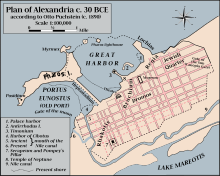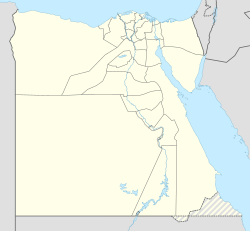 Map of ancient Alexandria. "2" marks the island of Antirhodos. | |
| Location | Alexandria |
|---|---|
| Region | Egypt |
| Coordinates | 31°12′24″N 29°54′01″E / 31.20667°N 29.90028°E |
| Altitude | −5 m (−16 ft) |
| Type | Island |
| Part of | Alexandria Port |
| Length | 300 metres (980 ft) |
| Area | 500 ha (1,200 acres) |
| History | |
| Founded | c. 250BC |
| Cultures | Ptolemaic Kingdom |
| Associated with | Cleopatra |
| Site notes | |
| Excavation dates | 1996 |
| Archaeologists | Franck Goddio |
| Condition | Submerged |
Antirhodos (sometimes Antirrhodos or Anti Rhodes) was an island in the eastern harbor of Alexandria, Egypt, on which a Ptolemaic Egyptian palace was sited. The island was occupied until the reigns of Septimius Severus and Caracalla[1] and it probably sank in the 4th century, when it succumbed to earthquakes and a tsunami following an earthquake in the eastern Mediterranean near Crete in the year 365. The site now lies underwater, near the seafront of modern Alexandria, at a depth of approximately five metres (16 ft).[2]
Descriptions of the island were recorded in classical antiquity by Greek geographers and historians. Strabo described a royal house on Antirhodos in 27 BC[3] and wrote that the island's name ("counter-Rhodes") derived from the island's rivalry with the island of Rhodes.[4] Antirhodos was part of Alexandria's ancient royal port called the Portus Magnus, which also included parts of the Lochias peninsula in the East and the island of Pharos in the West.[5] The Portus Magnus was abandoned and left as an open bay after an earthquake in the 8th century.
- ^ "Expositions (Grand Palais, Paris, 2006-2007): Trésors engloutis d'Égypte" [Exhibition (Grand Palais, Paris, 2006-7): Egypt's Sunken Treasures]. www.bubastis.be (in French). 2007. Retrieved 16 August 2015.
- ^ "Sphinx of Cleopatra's father emerges from waves". CNN News. 29 October 1998. Retrieved 15 August 2015.
- ^ Vizard, Frank (May 1999). "In Search of Cleopatra's Palace". Popular Science. 254 (5). Retrieved 16 August 2015.
- ^ Strabo. "The Geography of Strabo: Book XVII". The University of Chicago. Bill Thayer. Retrieved 23 July 2015.
They so called it as being a rival of Rhodes
- ^ Smith, William. Dictionary of Greek and Roman Geography. London: Walton and Maberly. p. 27. Retrieved 23 July 2015.
